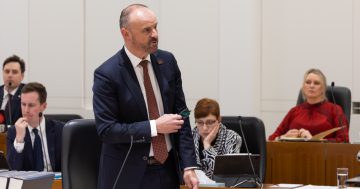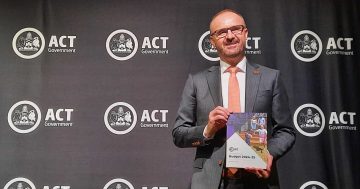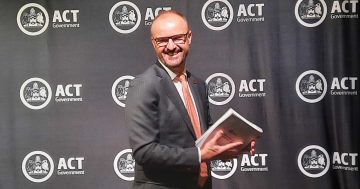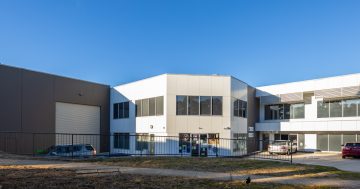
Balanced approach has put the ACT’s economic house in order, says Andrew Barr.
Rate increases of 7 per cent for houses and 10 per cent for units (see below), the scrapping of stamp duty for eligible first-home buyers and a return to surplus are the highlights of Treasurer Andrew Barr’s 2018 ACT Budget handed down on Tuesday.
In a Budget in which most of the big ticket items had already been announced, it was left to Mr Barr to declare that the Government’s hard work had paid off with a small surplus of $36.5 million, assisted by a $45 million GST windfall, and predicting that the Budget would remain in surplus across the forward estimates.
Rates revenue for 2018-19 is estimated at $348.7 million, reflecting a rise in general rates of about 7 per cent and increases in the number and value of new properties.
Standout issues, the good news and all the positives from the 2018-19 ACT Budget
There is plenty of positive news in this year’s ACT Budget, and The RiotACT came to you LIVE from the ACT Budget Breakfast where three Canberra experts wrapped up the standout issues, the good news and all the positives from yesterday’s announcements. Catherine McGrath from Catherine McGrath Media, Andrew Sykes from RSM Australia, and Archie Tsirimokos from Meyer Vandenberg Lawyers explained why this Budget has people pumped.
Posted by The RiotACT on Tuesday, June 5, 2018
The rate increase for units is higher due to the change in methodology for units and the removal of the $100 rebate that applied to units in 2017-18.
Mr Barr said the Government had listened to unit owners alarmed at the steep increase in their rates and extended the transition to the new methodology by a further year to allow them more time to adapt to the change.
Stamp duty rates continue to fall as part of the Government’s tax reform strategy, with an average rate of 4.56 per cent for properties between $500,000 and $750,000 in 2018-19. This will fall to 3.9 per cent by 2021-22.
He said cutting stamp duty had been an important part of the Government’s tax reform strategy to move away from transactional taxes.
“By 2021-22 someone buying a $500,000 home will be paying half the amount of stamp duty they would have been up for when we started this reform – a saving of $10,500,’’ he said.
Despite this, revenue is expected to increase to $208.8 million in 2018-19 as transactions return to a more normal level.
From 1 July 2019, first-home buyers with a household income of below $160,000 will no longer have to pay stamp duty on purchases of any value whether it be a new home or established property, but the trade-off will be the axing of the $7000 first-home owners grant.
Mr Barr, who believes the grant is more rightly a first-home seller’s grant, said the grants had not been effective in helping first home buyers into the market, and had actually made housing less affordable by inflating people’s borrowing power, overheating demand and boosting prices.
What does this year’s ACT Budget mean from a business, investment and property perspective?
What does this year’s ACT Budget mean from a business, investment and property perspective? The RiotACT came to you LIVE from the National Press Club of Australia to bring you reaction and analysis from three Canberra experts. Robyn Hendry of Canberra Business Chamber, Archie Tsirimokos from Meyer Vandenberg Lawyers and Andrew Sykes from RSM Australia shared their responses to the key Budget issues and what the new measures mean for business in the ACT.
Posted by The RiotACT on Tuesday, June 5, 2018
The Government believes this and a land release program over the next four years of 17,000 dwellings will also boost housing affordability, although only 31 per cent are for detached houses, 7 per cent semi-detached or terrace, and 62 per cent units.
Canberra’s growing population has boosted the ACT’s GST take and helped Mr Barr return the Budget to a balanced position.
“This means we are fully covering the cost of delivering services for Canberrans while building a buffer against future risks or shocks,’’ he said.
Mr Barr said the Government’s work to support the Territory economy through tough times had paid off in sustained economic growth over the past few years.
“This Budget estimates that this year’s growth for our economy will be 4.5 per cent. This will bring our total economic growth since 2014-15 to a very strong 13.6 per cent,’’ he said.
But net debt is $2.1 billion in 2018-2019 and is estimated to grow to $2.8 billion by 2021-22.
View full list of 2018-19 Residential General Rates by suburb.
2018-19 ACT Budget
- ACT economy ‘back in the black’ but challenges loom
- ACT Budget: Rates up 7 per cent, stamp duty to go for first-home buyers
- ACT Budget: Help for the homeless with more to come
- ACT Budget: Design work to start on a new Canberra Theatre Complex
- ACT Budget: $12.5m for light rail Stage 2 planning, plus start on Mitchell stop
- ACT Budget: Government to spend $9 million in bid to boost teacher skills
- ACT Budget: $1.8 million to help people through NDIS transition
- ACT Budget: $112 million for Canberra Hospital to boost ED and cut surgery waiting lists





















